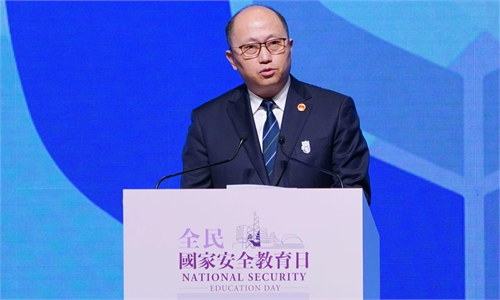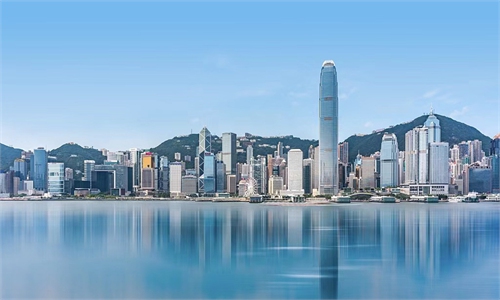HK scraps quarantine mandate to normalize epidemic management as 'conditions for treating COVID as endemic mature'

China downgraded its COVID management measures from Class A to Class B since January 8, 2023 as the nation readies for normal life. The photo shows Beijing welcomed its first inbound flight carrying 291 passengers from Hong Kong at around 10:40 am, on January 8, 2023. Photo: Li Hao/GT
Hong Kong further adjusted its COVID-19 response by ending compulsory quarantine for infected people starting from Monday, and those who tested positive are not required to report. In the eyes of experts, this move reflects the general trend of normalizing epidemic management and shows that the conditions for the city to treat it as endemic are already mature.
Some local officials told the Global Times that the decision of full border resumption between Hong Kong and the Chinese mainland without requiring nucleic acid test results is in sight, highly likely in February.
The Hong Kong Special Administrative Region (HKSAR) government announced earlier that starting from Monday (January 30), the compulsory quarantine arrangement for infected persons will be cancelled and health officers will no longer issue isolation orders to infected persons.
All persons who tested positive, either by nucleic acid tests or rapid antigen tests, are not required to report, and they should take advice from the city's health measures against respiratory infections. Those without symptoms can go out or go to work, and 71 general outpatient clinics all resumed normal services, reserving places for 2,000 infected people, local media reported on Monday.
HKSAR government pandemic adviser Ivan Hung Fan-ngai, from the University of Hong Kong, said that since 83 percent of the city's population already had three shots of vaccines, and many were infected during previous waves, a strong immunity barrier had been formed, so the conditions for Hong Kong to treat it as endemic are already mature.
Hundreds of COVID patients will be allowed to leave isolation facilities in Hong Kong from Monday, as one of the last remaining pandemic control measures comes to an end after more than three years, the South China Morning Post reported on Sunday.
Authorities dropped social-distancing measures on December 29 and resumed quarantine-free travel with the mainland on January 8, leaving only two major anti-epidemic measures in place - the mask mandate and mandatory testing for arrivals, students and care home residents, according to the media report.
Hong Kong has achieved strong hybrid immunity through high vaccination rates and high background natural infections since early 2022. The majority of confirmed cases in recent months were very mild or asymptomatic. Those who died were mainly elderly people who have not received or completed vaccination, David Hui Shu-cheong, an expert advisor to the HKSAR government on COVID-19, told the Global Times on Monday.
"So the isolation order can be abolished," the expert said.
"We will continue universal masking this winter. It is likely to be abolished in the spring or summer. However, masking will likely be required on public transport, and in healthcare facilities and nursing homes and disabled homes, as these are high-risk areas for outbreaks," Hui said.
Another Hong Kong professor told the Global Times on condition of anonymity that Hong Kong is set to gradually phase out its mask mandate outdoors in the middle of February, when temperatures get warmer. It is set to replace the nucleic acid test that is required for people who travel to the mainland with the fast antigen test, so as to further facilitate population flows between Hong Kong and the mainland.
"There are very few places that impose mandatory isolation for infected people. Hong Kong's adjustment reflects the general trend of dealing with the epidemic, making epidemic management normalized," Chen Xi, associate professor of health policy and economics at Yale University, told the Global Times on Monday.
With the Chinese city further adjusting its COVID approach, some officials suggested that it should further scrap the nucleic acid requirements between the city and the mainland to allow cross-border travel to fully resume.
"There have been fewer institutions providing nucleic acid tests in the mainland and it's hard to find places to take tests. Canceling the test requirement is pragmatic and I believe the decision will be made in the next few days," Tam Yiu-chung, a member of the National People's Congress Standing Committee from Hong Kong, told the Global Times on Monday.
Also, the daily quota of cross-border travelers at land checkpoints between Hong Kong and the mainland should also be scrapped, as the quota was established initially for preventing a huge amount of travelers during the Spring Festival holidays from creating pressure on the ports, Tam said.
Some public health experts said that there will be new waves if newer variants become predominant, such as XBB.1.5 in Singapore, but hopefully the majority of cases will be mild, especially if people continue to receive boosters.
"COVID has become endemic as it is widespread in the community and the source is not traceable in the majority of cases," Hui said.



